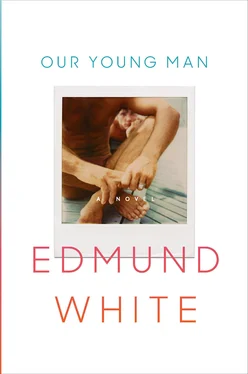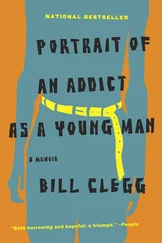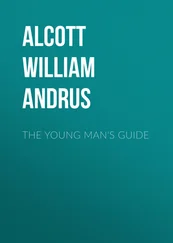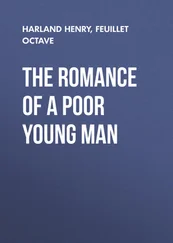Edmund White - Our Young Man
Здесь есть возможность читать онлайн «Edmund White - Our Young Man» весь текст электронной книги совершенно бесплатно (целиком полную версию без сокращений). В некоторых случаях можно слушать аудио, скачать через торрент в формате fb2 и присутствует краткое содержание. Год выпуска: 2016, Издательство: Bloomsbury USA, Жанр: Современная проза, на английском языке. Описание произведения, (предисловие) а так же отзывы посетителей доступны на портале библиотеки ЛибКат.
- Название:Our Young Man
- Автор:
- Издательство:Bloomsbury USA
- Жанр:
- Год:2016
- ISBN:нет данных
- Рейтинг книги:3 / 5. Голосов: 1
-
Избранное:Добавить в избранное
- Отзывы:
-
Ваша оценка:
- 60
- 1
- 2
- 3
- 4
- 5
Our Young Man: краткое содержание, описание и аннотация
Предлагаем к чтению аннотацию, описание, краткое содержание или предисловие (зависит от того, что написал сам автор книги «Our Young Man»). Если вы не нашли необходимую информацию о книге — напишите в комментариях, мы постараемся отыскать её.
Vogue
Our Young Man — читать онлайн бесплатно полную книгу (весь текст) целиком
Ниже представлен текст книги, разбитый по страницам. Система сохранения места последней прочитанной страницы, позволяет с удобством читать онлайн бесплатно книгу «Our Young Man», без необходимости каждый раз заново искать на чём Вы остановились. Поставьте закладку, и сможете в любой момент перейти на страницу, на которой закончили чтение.
Интервал:
Закладка:
“You will? When?”
“We’ll see.” Then he added spitefully, “You have a heavy schedule tomorrow?”
“I’ve got nothing planned but worry. I don’t even feel up to putting together this new movie deal.” He thought about it and said, “I should do the first AIDS movie — something very romantic, with two hot young macho studs dying.”
“How hot would they be,” Guy asked, “if they both had AIDS?”
“The lead would have to lose thirty pounds for the last three minutes. We’d cast a famous straight father of nine. Makeup would cover him with black spots — an Oscar, he’d get an Oscar for kissing a man. Boffo box office!”
Fred seemed cheered up by his new product. It was a way of mastering the disease. It was a way of turning tragedy to farce for profit.
It was a depressing winter and spring. Fred kept succumbing to one disease or another. One day he couldn’t write and he sat bemused in front of a few doodles. That turned out to be a parasite in the brain, toxoplasmosis, but they’d just discovered a way of routing it. Then he succumbed to PCP, the gay pneumonia, and he was put on a ventilator and an antibiotic drip. He lost sensation in his feet except for occasional stabbing pains: neuropathy. Guy was learning a new vocabulary. Fred would get better and would go on long walks with Guy, though he was a skeleton in baggy clothes. Everything his eyes landed on he wanted to buy. Soon the spare bedroom was full of ostrich eggs nesting on branching coral supports, storage ottomans, a signed first edition of Huckleberry Finn , a huge poster for the Italian version of Gone with the Wind , lots of bad paintings in gold frames. Everything went on his American Express card and Guy got a call from a hysterical Ceil; the kids had told her after a visit with Fred that Daddy was laying up treasures like a pharaoh furnishing his tomb. Guy, who wondered how she’d found his number, mumbled that he couldn’t intervene. He didn’t even know Fred that well. She started sobbing; “I don’t care if he’s gay. Gay, schmay. It’s the children’s inheritance I’m worried about.”
“Aren’t they already grown up and married, with children of their own?”
“You bastard, trying to rob my children, you filthy French harlot and … husband-stealer.”
Guy just hung up and shrugged. He didn’t pick up the ringing phone. It was sure to be the seal, the phoque . Two days later he received a letter in the mail poorly spelled and hastily written, calling him a Jezebel switching his little homo butt before the dazed eyes of a pathetic, dying old man. She knew all about the house on Fire Island and their drug-fueled orgies where gullible Fred had been deliberately infected with a fatal disease. She knew all about vicious fag home-breakers and gold diggers.
Guy just slapped the letter in front of Fred, who read it silently, intently, then looked up at Guy with a saturnine scowl. “The bitch will stop at nothing. We’ve got to transfer the ownership of the Pines house to you. I’ve heard stories of the family seconds after a death clearing out an apartment and changing the locks. The vultures! You can bet your bottom dollar Ceil will contest the will. We’ve got to put it in your name now and make it foolproof. I’ve heard of wills where if someone who’s getting a bequest contests the will, he gets nothing. That’s what I want.”
“In France you can’t disinherit your own children. Napoleonic law.”
“Well, lah-di-fuckin’-dah, it’s my money and I’ll leave it like I want to, to the great love of my life.”
As Guy walked home through the snow he felt bad he’d only put out that one time for Fred. If he’d only known Fred was going to die so soon, he’d have been less tight-assed about it. Coached by Pierre-Georges, Guy had been playing a deep game for long-term stakes, but there was going to be only the short term, as it turned out. Oh, well, he thought, maybe the great loves are always unreciprocated; did Beatrice put out for Dante, Eloisa for Abelard? Didn’t Abelard castrate himself or something extreme? If love worked out, it was just dull and normal — Guy had done Fred a favor by rejecting him, and Guy had avoided the disease.
Andrés was commuting out to Rutgers on a bus three days a week; he was in the last year of coursework for his Ph.D. The bus was cheaper than the train. He’d rented a studio nearby on Weehawken Street where he spent two or three days a week, just a room next door to a taxidermist storeroom: Everything smelled of naphthalene. He was away from home almost too much, though at first Guy had welcomed the time alone. What was he doing in his studio? Taking tricks there? Why did he need a studio?
And then Guy paid a surprise visit to him one day on the pretense that he was in the neighborhood and wanted to take him to lunch at a new restaurant on Greenwich Street. The room was very bleak, just a chair and a desk and a floor lamp. And everywhere prints by Dalí, or at least very faithful copies — horrible robot women and crucified Christs seen from a strange axonometric perspective, and vaporous, mounted Don Quixotes, melting watches and forks. All with pretentious, far-fetched surrealist names and big Dalí signatures.
“These must be worth a fortune,” Guy said. “Are they real?”
“They’re part of my research for my Ph.D.,” Andrés said, not looking Guy in the eye.
“Not every art history student can afford originals by his topic,” Guy said.
Andrés looked uncomfortable. “Let’s get out of here. These fumes are disgusting.”
“They smell like mothballs.”
“That’s what they are. Let’s go to that restaurant of yours — my treat. I’ve got an appointment at two-thirty.”
“Who with?”
“Uh, my professor.”
“I thought you said he was on leave in France.”
“Well, a dealer, if you must know. My treat today.”
Although Andrés had been poor or stingy when they first met, now he’d become a big spender — he covered Guy with expensive presents (seashells dipped in silver, a gold seal ring with an absurd coat of arms he’d invented, three parakeets on an apple, a white fox fur throw for the bed, first-class plane tickets for a weekend in San Juan, where he’d lodged them in El Convento, built around a courtyard, noisy all night with riotous birthday parties or business conventions). And he bought himself designer clothes which looked silly on him — skinny light blue Dolce & Gabbana trousers and an Hermès jacket of a beige canvas with big red darts, dozens of monogrammed shirts, old-fashioned lace-up shoes from Brooks and fur-lined black suede space boots, three good suits, and a Kenzo gray overcoat. Where was all the money coming from? His father had been laid off from his air-conditioning repair job, Andrés told him when Guy read an article about unemployment in Colombia. All this senseless spending made Guy uneasy, and whenever Andrés was about to purchase some new silly extravagance, Guy would say, “Do you really need it? Will you ever wear it? Why not save up and buy one really perfect blazer?” It was as if Andrés were buying as compulsively as Fred, as if he were embarrassed by all the cash stuffing his wallet. Mysterious people (a lady, a man) called and asked for Andrés; Guy overheard Andrés’s end of the conversation, which was all about delivery dates. “I can’t do it that fast,” Andrés said curtly. His hands were often stained with coffee; there’d been two hair dryers on his workshop desk — two? What for? Andrés never blow-dried his hair. Then he saw a scrap of paper on which Andrés had written the address of an art gallery in St. Louis — Drew Fine Arts. What was going on?
He knew what was going on but chose to ignore it. Andrés offered to pay Guy’s rent.
Читать дальшеИнтервал:
Закладка:
Похожие книги на «Our Young Man»
Представляем Вашему вниманию похожие книги на «Our Young Man» списком для выбора. Мы отобрали схожую по названию и смыслу литературу в надежде предоставить читателям больше вариантов отыскать новые, интересные, ещё непрочитанные произведения.
Обсуждение, отзывы о книге «Our Young Man» и просто собственные мнения читателей. Оставьте ваши комментарии, напишите, что Вы думаете о произведении, его смысле или главных героях. Укажите что конкретно понравилось, а что нет, и почему Вы так считаете.












